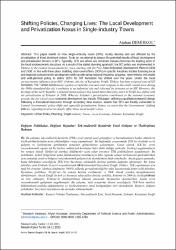Shifting policies, changing lives: The local development and privatization nexus in single-industry towns
Künye
Demirkol, A. (2023). Shifting Policies Changing Lives The Local Development and Privatization Nexus in Single-industry Towns. Amme İdaresi Dergisi, 56(4), 14–28.Özet
This paper dwells on how single-industry towns (SITs) locally develop and are affected by the privatization of those dominant sectors. To do so, we attempt to discuss the potential results of local development and privatization tension in SITs. Typically, SITs are where one dominant industry becomes the leading actor in the local socioeconomic structure. As a result of the statist planning approach, the SIT policy was implemented in Türkiye by the Central Governments for years, starting with the Five-Years Industrial Development Plans in 1934 and 1938. In line with these plans, building state-owned firms (SOFs) in specific locations implies fostering local and regional socioeconomic development while accelerating national industrial progress. Nevertheless, this statist and well-planned policy to utilize SOFs for SIT formation has shifted over the years. Under the local socioeconomic influence of an SOF, Erdemir, the city of Karadeniz Ereğli, Türkiye, has been a typical case of SIT formation. The Turkish Government’s policy to build the iron and steel company in the small coastal town during the 1960s stimulated the city’s evolution to an industrial city and reformed its structure as an SIT. However, the heritage of the early Republic’s planned statist policies that lasted more than forty years in Ereğli has shifted with the privatization of Erdemir in 2006. Whereas Erdemir’s privatization contributed to the national economic growth, the city’s local socio-economic development has shrunk. This paper, utilizing a qualitative research design following a theoretical discussion through secondary data sources, asserts that SITs are locally vulnerable to Central Governments’ policy shifts and especially privatization. Hence, we stress that the Governments’ shifting policies regarding local areas deeply affect those local people’s lives. Bu çalışma, tek-endüstrili kentlerin (TEK) yerel olarak nasıl geliştiğine ve barındırdıkları baskın aktörlerin özelleştirilmelerinden nasıl etkilendiğine vurgu yapmaktadır. Bu bağlamda, araştırmada TEK’ler özelinde yerel gelişme ve özelleştirme geriliminin sonuçları gösterilmeye çalışılmıştır. Genel olarak TEK’ler, yerel sosyoekonomik yapıda tek bir baskın endüstriyel kuruluşun lider aktör olduğu yerlerdir. Devletçi uygulamaların bir sonucu olarak Türkiye’de merkezi hükümetler uzun yıllar boyunca TEK politikalarını uygulamıştır. Bu politikalar, belirli bölgelerde kamu fabrikalarının kurulmasıyla ülke çapında sanayi ilerlemesini güçlendirirken aynı zamanda yerel ve bölgesel sosyoekonomik gelişmeyi de desteklemeyi ifade etmektedir. Ancak geçen zamanda, kamu fabrikaları aracılığıyla TEK’lerin kurulması yönündeki devletçi politika değişime uğramıştır. Bir kamu fabrikası olan Erdemir’in yerel sosyoekonomik etkisi altısındaki Karadeniz Ereğli, Türkiye, TEK yapılanması için tipik bir örnektir. Merkezi hükümetin 1960’lı yıllarda gerçekleştirdiği bir sahil kasabasında demir çelik fabrikası kurulması politikası, Ereğli’nin bir sanayi kentine evrilmesini ve TEK olarak yeniden kurgulanmasını dürtülemiştir. Ancak Ereğli’de kırk yıl boyunca takip edilen devletçi politika, Erdemir’in 2006’da özelleştirilmesi ile terk edilmiştir. Erdemir’in özelleştirilmesi ülkenin ekonomik büyümesini desteklerken, kentin yerel sosyoekonomik gelişimini engellemiştir. Bu çalışma, nitel araştırma deseni aracılığıyla TEK’lerin merkezi hükümetlerin politika değişimlerine ve özelleştirmelere yerel kırılganlığını ileri sürmektedir. Böylece, değişen politikalar, bireylerin hayatlarını da derinden etkilemektedir.



















